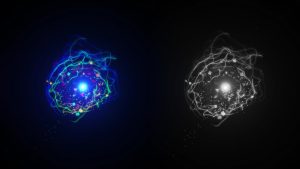
Quantum Entanglement in the Brain: A Potential Breakthrough in Understanding Consciousness
Researchers across the globe have been exploring the intriguing possibility that quantum entanglement plays a role in brain function and consciousness. Recent findings suggest that this strange quantum phenomenon could help explain how the brain synchronizes neural activity and gives rise to our subjective experience of awareness.
Nerve Fibers and Quantum Entanglement
A team of physicists from Shanghai University and Sichuan University in China has proposed that nerve fibers in the brain might produce pairs of entangled particles. This hypothetical entanglement could facilitate the coordination of neuronal firing across vast networks, addressing the challenge of synchronizing activity among distant neurons. If backed by experimental observations, this phenomenon could revolutionize our understanding of how the brain functions as a coherent whole.
Probing Quantum Effects with Advanced Imaging
Researchers from Trinity College Dublin have taken a novel approach to investigating quantum processes in the brain. By adapting an idea developed to prove the existence of quantum gravity, they used magnetic resonance imaging (MRI) to search for signs of entanglement among proton spins in “brain water”. Remarkably, they found MRI signals that resemble heartbeat-evoked potentials, a form of electroencephalogram (EEG) signal associated with conscious awareness. Crucially, this entanglement signal diminished when subjects fell asleep, suggesting a potential quantum underpinning for consciousness itself.
Implications for Understanding the Brain
If quantum entanglement is indeed at work in the brain, it could help explain the brain’s remarkable computational power and ability to perform complex tasks like creativity and problem-solving. The Penrose-Hameroff model, which proposes that microtubules within neurons act as quantum computers, has long suggested that quantum coherence within these structures could influence cognitive processes. The new findings lend support to this controversial theory and open up exciting new avenues for exploring the nature of consciousness.
Skepticism and the Need for Further Research
Despite the intriguing possibilities, skepticism remains prevalent in the scientific community. Critics argue that the brain’s warm, noisy environment may disrupt quantum states before they can be utilized for neural processing. This decoherence poses a significant challenge to the viability of quantum theories in explaining consciousness. Further experimental validation is necessary to confirm these theories and their implications for neuroscience and philosophy.
In conclusion, the exploration of quantum entanglement in the brain is a burgeoning field that could reshape our understanding of consciousness and cognitive function. While early findings are promising, much work remains to be done to determine the extent to which quantum mechanics plays a role in the brain’s extraordinary capabilities.

